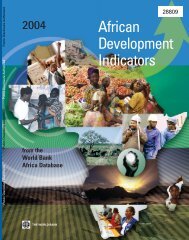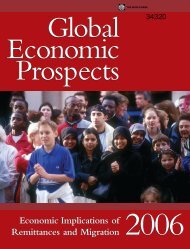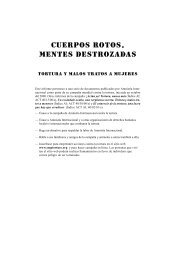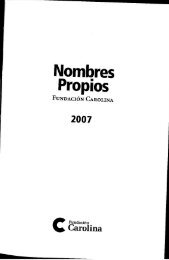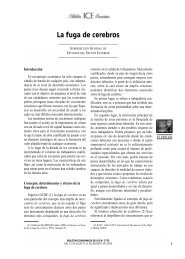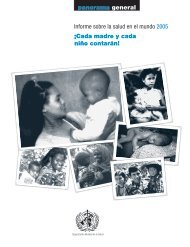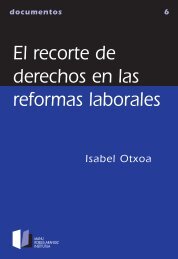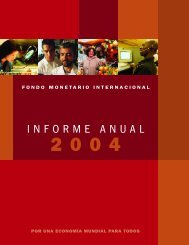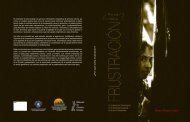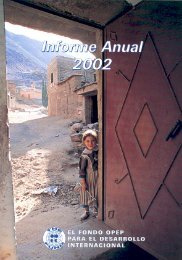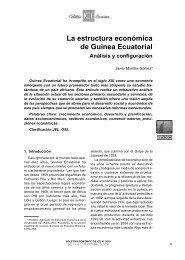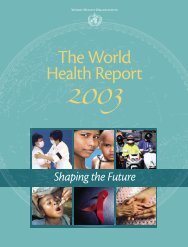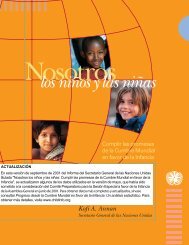Educación para todos: el imperativo de la calidad; Informe ... - eFaber
Educación para todos: el imperativo de la calidad; Informe ... - eFaber
Educación para todos: el imperativo de la calidad; Informe ... - eFaber
- No tags were found...
Create successful ePaper yourself
Turn your PDF publications into a flip-book with our unique Google optimized e-Paper software.
005442 / ANEXO2<strong>Informe</strong> <strong>de</strong> Seguimiento <strong>de</strong> <strong>la</strong> Educación <strong>para</strong> Todos en <strong>el</strong> MundoHanushek, E. A.; Kain, J. F.; y Rivkin, S. G. 1999. Do higher sa<strong>la</strong>ries buy better teachers?. Cambridge(Massachusetts, EE.UU.), Oficina Nacional <strong>de</strong> Investigación Económica (NBER) (Documento <strong>de</strong> trabajo<strong>de</strong> <strong>la</strong> NBER Nº 7.082).—. 2004. “Why Public Schools Lose Teachers”. Journal of Human Resources, Vol. 39, Nº 2, págs. 326-354.Hanushek, E. A.; y Kimko, D. D. 2000. “Schooling, <strong>la</strong>bor-force quality, and the growth of nations”. AmericanEconomic Review, Vol. 90, Nº 5, págs. 1.184-1.208.Hanushek, E. A.; y Luque, J. A. 2003. “Efficiency and equity in schools around the world”. Economics of EducationReview, Vol. 22, Nº 5, págs. 481-502.Hanushek, E. A.; y Pace, R. R. 1995. “Who chooses to teach (and why)?”. Economics of Education Review, Vol. 14,Nº 2, págs. 101-117.Hanushek, E. A.; y Rivkin, S. G. 2003. “Does public school competition affect teacher quality?” en C. M. Hoxby(compi<strong>la</strong>dor), The economics of school choice. Chicago, University of Chicago Press.Hanushek, E. A.; Rivkin, S. G.; y Taylor, L. L. 1996. “Aggregation and the estimated effects of school resources”.Review of Economics and Statistics, Vol. 78, Nº 4, págs. 611-627.Hargreaves, A.; Lieberman, A.; Ful<strong>la</strong>n, M.; y Hopkins, D. (compi<strong>la</strong>dor). 1998. International handbook of educationalchange. Dordrecht, Kluwer Aca<strong>de</strong>mic Press.Hargreaves, D. 1999. “Revitalising educational research: lessons from the past and proposals for the future”.The Cambridge Journal of Education, Vol. 29, Nº 2, págs. 242-260.—. The production, mediation and use of professional knowledge among teachers and doctors: a com<strong>para</strong>tiveanalysis en Knowledge management in the learning society. París, CERI/OCDE, págs. 219-238.Hargreaves, D.; y Hopkins, D. 1994. Dev<strong>el</strong>opment p<strong>la</strong>nning for school improvement. Londres, Cass<strong>el</strong>l.Harlen, W.; y James, M. 1997. “Assessment and learning: differences and r<strong>el</strong>ationships between formativeand summative assessment”. Assessment in Education, Vol. 4, Nº 3, págs. 365-379.Hattie, J. 1992. S<strong>el</strong>f-concept. Hillsdale (Nueva Jersey), Lawrence Erlbaum Associates.Heckman, J. J.; y Rubinstein, Y. 2001. “The importance of noncognitive skills: lessons from the GED testingprogram”. American Economic Review, Vol. 19, Nº 2, págs. 145-149.Heckman, J. J.; y Vyt<strong>la</strong>cil, E. 2001. “I<strong>de</strong>ntifying the role of cognitive ability in exp<strong>la</strong>ining the lev<strong>el</strong> of and changein the return to schooling”. Review of Economics and Statistics, Vol. 83, Nº 1, págs. 1-12.Hedges, J. 2002. “The importance of posting and interaction with the education bureaucracy in becoming a teacherin Ghana”. International Journal of Educational Dev<strong>el</strong>opment, Vol. 22, Nº 3/4, págs. 353-366.H<strong>el</strong>vetas. 2002. 10 key stages towards effective participatory curriculum <strong>de</strong>v<strong>el</strong>opment: learning from practiceand experience in the Social forestry support programme, Vietnam, and other H<strong>el</strong>vetas-supported projects.Zurich, H<strong>el</strong>vetas (Experience and Learning in International Cooperation, Nº 2).Heston, A.; Summers, R.; y Aten, B. 2002. Penn world table version 6.1. Fi<strong>la</strong>d<strong>el</strong>fia, Center for InternationalComparison, Universidad <strong>de</strong> Pensilvania.High/Scope Educational Research Foundation. 2004. The IEA preprimary project age 7 follow-up. Ypsi<strong>la</strong>nti(Michigan, EE.UU.), High/Scope.Hoeven-Van Doornum, A. A.; y Jungbluth, P. 1987. “De bijdrage van schoolkenmerken aan schooleffectiviteit”[Pertinencia <strong>de</strong> <strong>la</strong>s características <strong>de</strong> <strong>la</strong> escu<strong>el</strong>a <strong>para</strong> su eficacia] en J. Scheerens y W. G. R. Sto<strong>el</strong>(compi<strong>la</strong>dores), Effectiviteit van on<strong>de</strong>rwijsorganisaties [Eficacia <strong>de</strong> <strong>la</strong>s organizaciones educativas].Lisse (Países Bajos), Swets & Zeitlinger.Honduras, Ministerio <strong>de</strong> Educación. 2003. <strong>Informe</strong> Nacional <strong>de</strong> Rendimiento Académico 2002.Tercero y sexto grados.Tegucigalpa, Unidad Externa <strong>de</strong> Medición <strong>de</strong> <strong>la</strong> Calidad <strong>de</strong> <strong>la</strong> Educación, Universidad Pedagógica NacionalFrancisco Morazán.Hopkin, A. G. 1997. “Staff perspectives on teaching and learning styles in teacher education in Botswana”.Journal of the International Society for Teacher Education, Vol. 1, Nº 1, págs. 1-11.Hopkins, D. 2001. School improvement for teal. Londres/Nueva York, Routledge/Falmer.Hopkins, D.; Ainscow, M.; y West, M. 1994. School improvement in an era of change. Londres, Cass<strong>el</strong>l.Hoppers, W. 1998. “Teachers’resource centers in Southern Africa; an investigation into local autonomy an<strong>de</strong>ducational change”. International Journal of Educational Dev<strong>el</strong>opment, Vol. 18, Nº 3, págs. 229-246.—. 2001. “About how to reach the truth in <strong>de</strong>v<strong>el</strong>opment cooperation: ODA/DFID’s Education Papers”.International Journal of Educational Dev<strong>el</strong>opment, Vol. 21, Nº 5, págs. 463-470.



